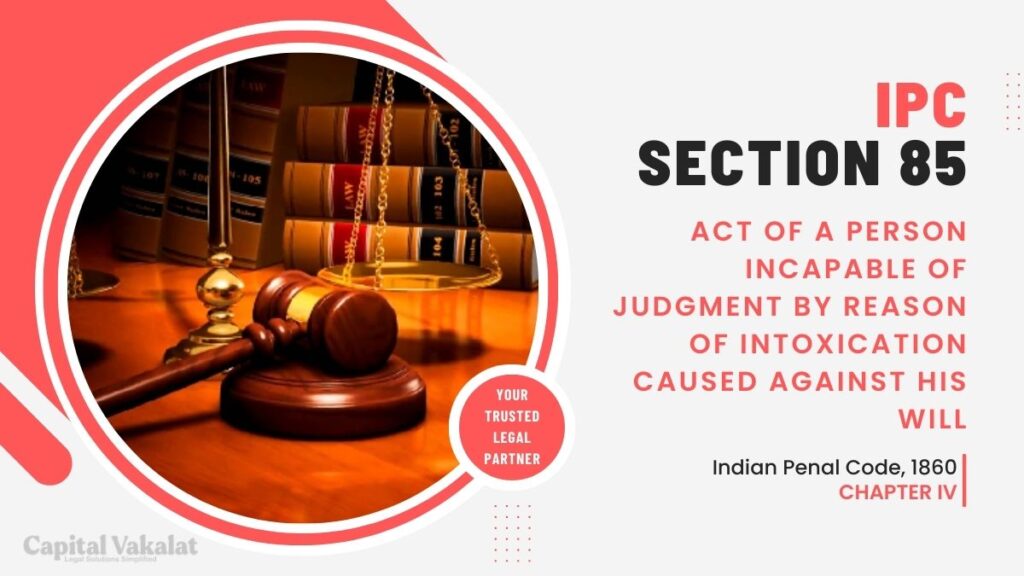In the world of legal jurisprudence, there are often complex scenarios that demand careful analysis and interpretation. Section 85 of the Indian Penal Code (IPC) deals with a situation that can be described as morally and legally perplexing. It addresses the actions of a person who finds themselves incapable of judgment due to intoxication caused against their will.

In this article, we will delve into the intricacies of Section 85 IPC, exploring its provisions and implications.
Understanding Section 85 IPC
Section 85 of the IPC is a legal provision that recognizes the unique circumstances surrounding acts committed under the influence of intoxication. It states that “Nothing is an offense which is done by a person who, at the time of doing it, is, by reason of intoxication, incapable of knowing the nature of the act, or that he is doing what is either wrong or contrary to law.” In simpler terms, if an individual is involuntarily intoxicated to the point where they cannot comprehend the consequences of their actions, they may not be held criminally liable for those actions.
Key Elements of Section 85 IPC
To gain a comprehensive understanding of Section 85, it’s essential to break down its key elements:
Involuntary Intoxication
The provision applies when an individual becomes intoxicated against their will. This could occur through the administration of drugs or substances without their knowledge or consent.
Incapacity to Judge
The person must be so intoxicated that they are unable to understand the nature of their actions or recognize that what they are doing is wrong or illegal.
No Criminal Liability
Section 85 provides immunity from criminal prosecution for acts committed under the specified conditions.
Legal Precedents
Legal precedents play a crucial role in interpreting and applying Section 85 IPC. Courts have consistently upheld the principle that the accused must establish their incapacity to judge due to involuntary intoxication. Several cases have set important precedents, emphasizing the need for clear evidence of involuntary intoxication to claim immunity under this provision.
Burden of Proof
One of the challenges in invoking Section 85 IPC is the burden of proof. The accused must demonstrate that they were intoxicated against their will and that this intoxication rendered them incapable of understanding the consequences of their actions. This requirement underscores the importance of thorough legal representation and evidence in such cases.
Conclusion
Section 85 IPC serves as a vital legal safeguard for individuals who find themselves in a morally ambiguous situation. It recognizes that actions committed under involuntary intoxication may not always warrant criminal liability. However, it is essential to navigate this provision with care and a strong legal defense to establish the necessary conditions for immunity.
FAQs
Is Section 85 IPC applicable in cases of voluntary intoxication?
No, Section 85 specifically addresses acts committed under involuntary intoxication.
What role do legal precedents play in Section 85 cases?
Legal precedents help interpret and apply Section 85, emphasizing the need for clear evidence of involuntary intoxication.
How does one prove incapacity to judge under Section 85 IPC?
The accused must provide compelling evidence that their intoxication rendered them incapable of understanding the nature and consequences of their actions.
Is Section 85 IPC a blanket immunity for all acts committed under intoxication?
No, Section 85 IPC applies only when the intoxication is involuntary and results in an inability to judge the nature of the act.